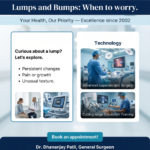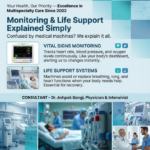Recovering from back surgery is a journey that requires dedication, care, and the right guidance. While surgery addresses the root cause of spinal problems, physiotherapy ensures a smooth and complete recovery. Let’s explore the critical role physiotherapy plays in restoring mobility, strength, and overall quality of life after back surgery.
Understanding the Importance of Physiotherapy Post-Surgery
Back surgery can be life-changing, relieving chronic pain and correcting structural issues. However, the recovery period is as crucial as the procedure itself. Physiotherapy bridges the gap between surgery and returning to daily activities, ensuring a comprehensive healing process.
Goals of Physiotherapy After Back Surgery
Physiotherapy is tailored to individual needs and surgery types. Its primary goals include:
- Restoring Mobility: Gentle movements and stretches improve flexibility and joint function.
- Building Strength: Focused exercises strengthen the back and core muscles for better support.
- Managing Pain: Techniques like manual therapy, ice/heat application, and targeted exercises reduce postoperative pain.
- Improving Posture: Correcting postural issues to prevent future problems and reduce strain on the spine.
- Enhancing Functionality: Helping patients regain the ability to perform daily tasks comfortably.
Stages of Physiotherapy Post-Surgery
Recovery involves multiple phases, each with specific physiotherapy goals:
- Early Recovery Phase (1-4 weeks post-surgery):
- Focus on reducing pain and inflammation.
- Gentle mobilization exercises, such as ankle pumps and knee bends, prevent stiffness and improve circulation.
- Patient education on safe movements, like sitting, standing, and lying down.
- Intermediate Phase (4-12 weeks post-surgery):
- Gradual introduction of strength-building exercises for the core and lower back.
- Use of equipment like resistance bands for progressive training.
- Balance and stability exercises to improve coordination and prevent falls.
- Advanced Phase (3-6 months post-surgery):
- Advanced strengthening exercises for long-term spinal support.
- Integration of cardiovascular activities like walking or swimming for overall fitness.
- Focus on returning to work, sports, or other physical activities.
Key Physiotherapy Techniques for Recovery
Physiotherapists use a range of evidence-based techniques to ensure optimal recovery:
- Manual Therapy: Hands-on techniques to relieve muscle tension, improve joint mobility, and promote healing.
- Stretching and Strengthening Exercises: Targeted exercises enhance flexibility and build strength in the back and core muscles.
- Postural Training: Teaching proper sitting, standing, and sleeping positions to reduce stress on the spine.
- Electrotherapy: Modalities like TENS (Transcutaneous Electrical Nerve Stimulation) for pain management and muscle stimulation.
- Hydrotherapy: Exercises performed in water to reduce strain on joints while enhancing strength and mobility.
Benefits of Physiotherapy Post-Back Surgery
Physiotherapy provides a wide range of physical and psychological benefits, including:
- Accelerated Recovery: Active participation in therapy speeds up the healing process.
- Pain Relief: Reduces dependency on medications by naturally alleviating pain.
- Preventing Recurrence: Strengthens the spine to avoid future injuries or complications.
- Restored Confidence: Helps patients feel in control of their recovery journey.
- Improved Quality of Life: Enables patients to return to their favorite activities, work, and social life.
Common Challenges in Recovery and How Physiotherapy Helps
- Fear of Movement: Many patients fear re-injury, leading to inactivity. Physiotherapy builds confidence by teaching safe movement techniques.
- Muscle Weakness: Post-surgical immobility can weaken muscles. Physiotherapy targets these muscles to restore strength and endurance.
- Postural Issues: Poor posture during recovery can cause additional strain on the spine. Physiotherapists ensure proper alignment through exercises and ergonomic advice.
Role of the Patient in Physiotherapy
Recovery is a collaborative effort between the patient and physiotherapist. Here’s how patients can maximize the benefits of therapy:
- Stay Committed: Follow the prescribed exercises and therapy sessions diligently.
- Communicate Openly: Share any discomfort or concerns with your physiotherapist.
- Practice Patience: Understand that recovery takes time and consistent effort.
- Maintain a Healthy Lifestyle: Eat nutritious foods and stay hydrated to support healing.
Advanced Physiotherapy Solutions at Chetna Multispeciality Hospital
At Chetna Multispeciality Hospital, we’re committed to providing world-class post-surgical care. Our team of experienced physiotherapists works closely with patients to design customized recovery plans, incorporating the latest techniques and technologies.
Why choose us?
- Holistic Approach: We focus on overall well-being, not just physical recovery.
- State-of-the-Art Facilities: Equipped with advanced tools for effective rehabilitation.
- Expert Team: Our physiotherapists have extensive experience in post-surgical care.
- Personalized Care: Every recovery plan is tailored to the patient’s specific needs.
Tips for a Smooth Recovery Journey
- Follow your physiotherapy schedule without fail.
- Wear comfortable clothing during therapy sessions.
- Use ergonomic furniture and maintain proper posture.
- Avoid heavy lifting or strenuous activities as advised by your surgeon and physiotherapist.
- Celebrate small milestones to stay motivated.
Your Recovery Journey Starts Here
Back surgery is a step toward a pain-free life, and physiotherapy ensures you make the most of it. By restoring strength, mobility, and confidence, it empowers you to return to the activities you love. At Chetna Multispeciality Hospital, we’re here to walk with you every step of the way—from your first session to complete recovery.
Heal stronger, move freer with expert physiotherapy at Chetna Multispeciality Hospital.













